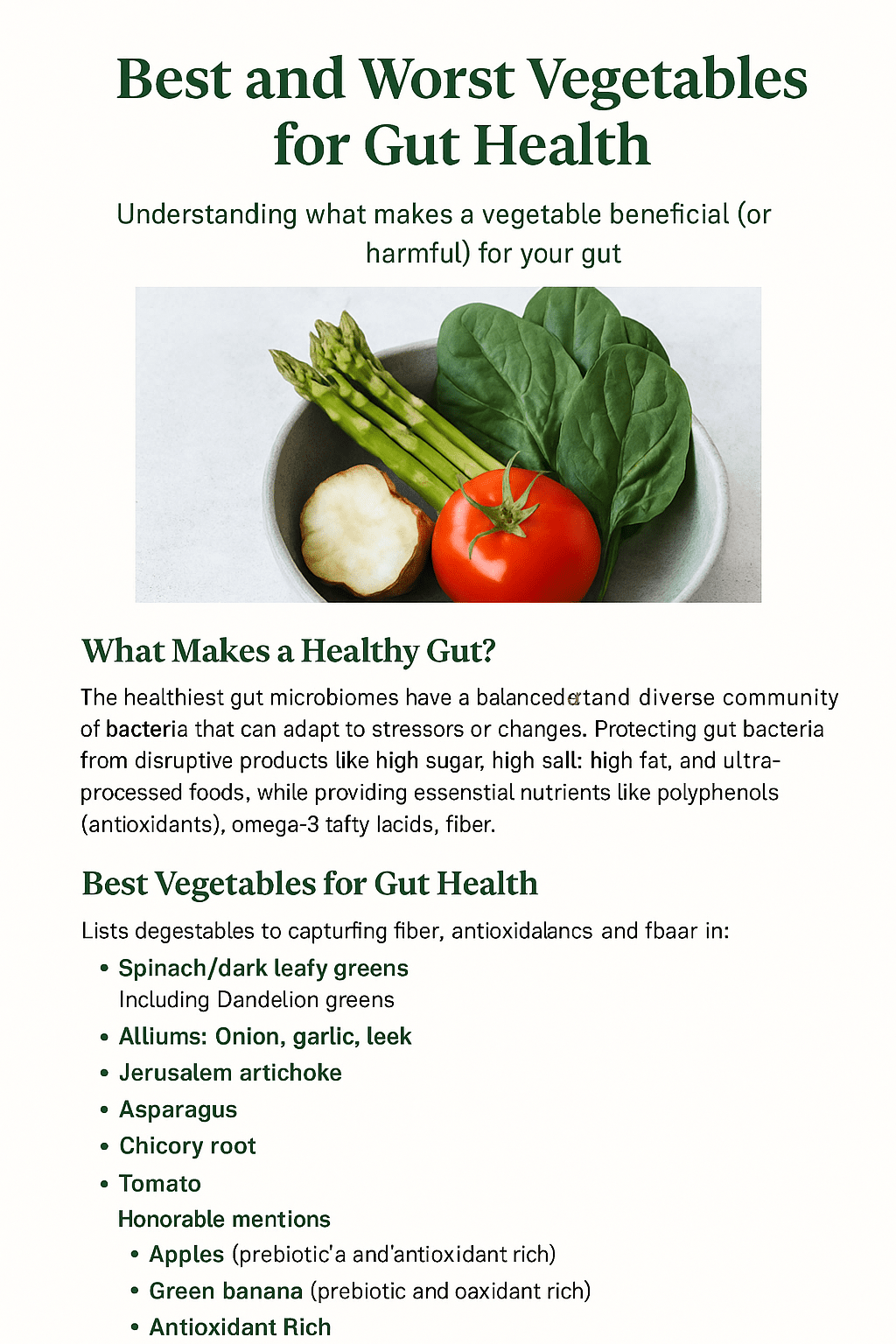Your gut is home to trillions of bacteria that play a vital role in digestion, immunity, metabolism, and even mood. A healthy gut isn’t just about avoiding stomach aches—it’s about achieving optimal wellness from the inside out. But what exactly feeds a healthy gut? And which vegetables help (or harm) the microbiome?
Let’s explore what makes a gut-friendly vegetable and highlight the best (and worst) choices according to health experts.

What Makes a Vegetable Good for Gut Health?
To support a healthy gut microbiome, the ideal foods should:
- Be high in fiber (especially prebiotic fiber)
- Contain polyphenols (powerful antioxidants)
- Offer a source of omega-3 fatty acids (for anti-inflammatory effects)
- Be minimally processed and free from excess sugar, salt, and fat
Fun fact: From a botanical standpoint, fruits are seed-containing parts of plants, while vegetables are typically the other parts (stems, roots, leaves, etc.). This means some foods we call vegetables (like tomatoes) are technically fruits—but they still count!
Top Vegetables for Gut Health
1. Dark Leafy Greens (e.g., Spinach, Dandelion Greens)
High in fiber and polyphenols, leafy greens are gut heroes. Dandelion greens also offer inulin, a powerful prebiotic fiber.
2. Alliums (Onion, Garlic, Leek)
Rich in prebiotic compounds like inulin and fructooligosaccharides (FOS), these vegetables help grow beneficial bacteria.
3. Jerusalem Artichoke
Known for its high inulin content, this vegetable feeds gut bacteria and promotes diversity in the microbiome.
4. Asparagus
A versatile vegetable with both prebiotic fiber and antioxidants.
5. Chicory Root
One of the richest sources of inulin fiber, chicory is a potent fuel source for probiotics.
6. Tomatoes
Technically a fruit, but often eaten as a vegetable, tomatoes are full of antioxidants and fiber, making them great for gut health.
Honorable Mentions: Gut-Loving Plant Products
- Apples – Prebiotic and antioxidant rich
- Green bananas – High in resistant starch, a prebiotic
- Berries – Excellent sources of polyphenols
- Beans (red, pinto, etc.) – Fiber and antioxidant-rich
- Seaweed & Algae – Omega-3 fatty acids and prebiotic fiber
- Edamame – Plant-based source of omega-3s and protein
Vegetables to Watch Out For
While most vegetables are naturally good for you, the worst choices are those altered by food processing. This includes:
- Canned vegetables with added salt or preservatives
- Fried or breaded vegetables
- Vegetables served in creamy, high-fat sauces
- Veggies soaked in sugary syrups
The problem isn’t the vegetable itself, but how it’s been modified. Always aim for fresh, frozen, or minimally cooked options without additives.
Balanced Diet = Happy Gut
You don’t have to eliminate any food group completely. Even foods like avocado, celery, beets, and grapes have their place in a gut-healthy diet. But if you’re trying to optimize your gut microbiome, focus on fiber-rich, antioxidant-packed, and omega-3-rich vegetables and plant foods.
When to Get Expert Support
If you’re struggling with digestive issues, chronic bloating, or want to personalize your gut health journey, meeting with a Registered Dietitian can help. At RescueMD, our healthcare team provides tailored nutrition plans to support digestive wellness and overall health.
FAQs About Vegetables and Gut Health
Q: What is the best vegetable for gut health?
A: Dandelion greens and Jerusalem artichokes are at the top due to their high prebiotic fiber content.
Q: Should I avoid vegetables that cause gas?
A: Some gas is normal when increasing fiber. Gradually introduce these foods and drink plenty of water.
Q: Are raw vegetables better than cooked?
A: Both have benefits. Cooking can reduce bloating and help absorb nutrients, but raw vegetables often contain more fiber.
Ready to Improve Your Gut Health?
Explore how nutrition can transform your wellness. Book a consultation with one of our providers today at www.myrescuemd.com.